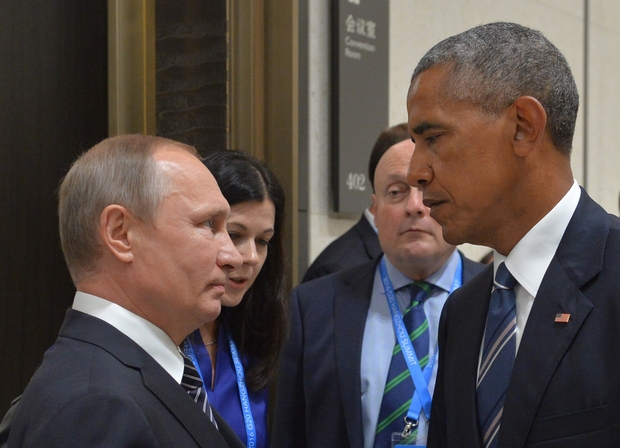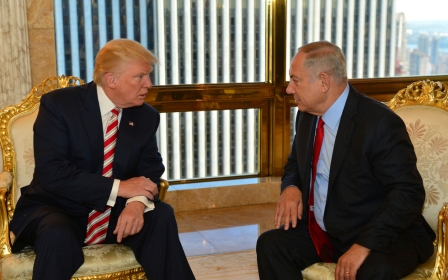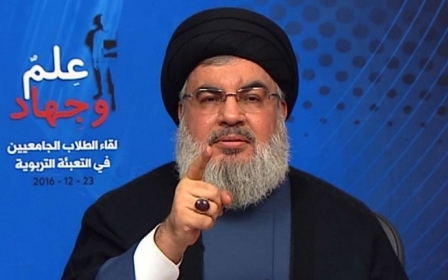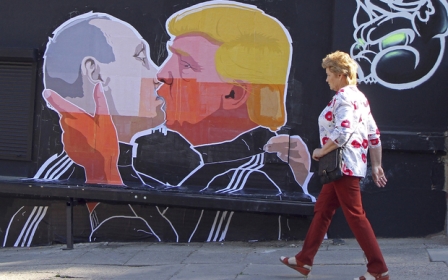US slaps sanctions on Russia for election hackings

President Barack Obama ordered the expulsion of 35 suspected Russian spies and imposed sanctions on two Russian intelligence agencies over their alleged involvement in hacking US political groups in the 2016 presidential election.
"I have ordered a number of actions in response to the Russian government's aggressive harassment of US officials and cyber operations aimed at the US election," Obama said.
"These actions follow repeated private and public warnings that we have issued to the Russian government, and are a necessary and appropriate response to efforts to harm US interests in violation of established international norms of behaviour."
The measures, taken during the last days of Obama's presidency, mark a new post-Cold War low in US-Russian ties, which have deteriorated over Ukraine and Syria.
Allegations by US intelligence agencies that Russian President Vladimir Putin personally directed efforts to intervene in the US election process by hacking mostly Democrats have made relations even worse.
'These actions follow repeated private and public warnings that we have issued to the Russian government' - President Barack Obama
It was not immediately clear whether President-elect Donald Trump, who has repeatedly praised Putin and nominated people seen as friendly toward Moscow to senior administration posts, would seek to roll back the measures once he takes office on 20 January.
The Kremlin, which denounced the sanctions as unlawful and promised "adequate" retaliation, questioned whether Trump approved of the new sanctions. Moscow denies the hacking allegations.
US intelligence agencies say Russia was behind hacks into Democratic Party organisations and operatives ahead of the 8 November presidential election. US intelligence officials also say that the Russian cyber attacks were aimed at helping Trump, a Republican, defeat Democrat Hillary Clinton.
Trump on Thursday responded to a slew of US election related sanctions against Russia with a call for the country to "move on" and a conciliatory pledge to meet US spy chiefs he has harshly criticised.
"It's time for our country to move on to bigger and better things," Trump said, echoing previous prickly reactions to allegations his November win over Hillary Clinton was somehow tainted by Russian interference.
"Nevertheless, in the interest of our country and its great people, I will meet with leaders of the intelligence community next week in order to be updated on the facts of this situation," he added.
Should Trump seek to overturn Obama's measures, he would likely encounter wide bipartisan Congressional opposition.
US House of Representatives Speaker Paul Ryan, the top Republican in Congress, said Russia "has consistently sought to undermine" US interests and that the sanctions were overdue.
Republican Senators John McCain and Lindsey Graham said they intended to lead the effort in Congress to "impose stronger sanctions on Russia".
The actions on Thursday were the strongest response by the Obama administration to Russia's cyber activities. However, a senior administration official acknowledged that Trump could reverse them and allow Russian intelligence officials back into the US once he takes office. He said that would be "inadvisable".
"We believe these steps are important because Russia is not going to stop," one official said. "We have every indication that they will interfere in democratic elections in other countries, including some of our European allies," the official said.
Sanctions on Russian intelligence
Obama is seeking to deter Russia and other foreign governments from leveraging cyber attacks in the future to meddle in US politics, former officials and cyber security experts said.
Two Russian intelligence agencies, the GRU and FSB, will face sanctions, along with four individual GRU officers, including agency chief Igor Valentinovich Korobov, and three other entities.
In addition, the US Treasury slapped sanctions on two individuals, Evgeniy Mikhailovich Bogachev and Aleksey Alekseyevich Belan, for "involvement in malicious cyber-enabled activities".
The sanctions freeze any assets they may have in the US and block US companies from doing business with them.
Obama said the State Department declared as "persona non grata" 35 Russian intelligence operatives and is closing two Russian compounds in New York and Maryland that were used by Russian personnel for "intelligence-related purposes". The State Department originally said the 35 were diplomats.
A senior US official told Reuters the expulsions would come from the Russian embassy in Washington and consulate in San Francisco. The Russian embassy declined to comment on the expulsions.
"These actions were taken to respond to Russian harassment of American diplomats and actions by the diplomats that we have assessed to be not consistent with diplomatic practice," the official said.
The Russians have 72 hours to leave the United States, the official said. Access to the two compounds will be denied to all Russian officials as of noon on Friday, the senior US official added.
The State Department has long complained that Russian security agents and traffic police have harassed US diplomats in Moscow, and US Secretary of State John Kerry has raised the issue with Putin and his foreign minister, Sergei Lavrov.
The US also released an analysis report by the FBI and Department of Homeland Security that linked the cyber attacks to computer systems used by Russian intelligence services.
New MEE newsletter: Jerusalem Dispatch
Sign up to get the latest insights and analysis on Israel-Palestine, alongside Turkey Unpacked and other MEE newsletters
Middle East Eye delivers independent and unrivalled coverage and analysis of the Middle East, North Africa and beyond. To learn more about republishing this content and the associated fees, please fill out this form. More about MEE can be found here.




